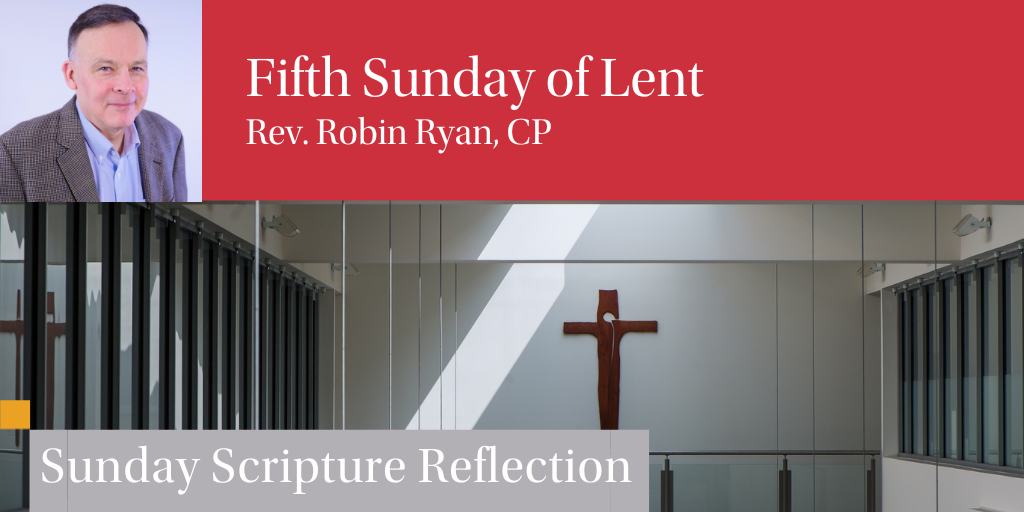
Readings:
Reading I: Jer 31:31-34
Psalm: 51:3-4, 12-13, 14-15
Reading II: Heb 5:7-9
Gospel: Jn 12:20-33
If we want to get to know someone well, to become a true friend, we need to spend time with them in many different moments in their lives. We need to celebrate with them in times of joy and accomplishment, to encourage them when they are struggling or disheartened, and to receive their help and encouragement when we are in need. We need to see what it is that guides their life and pursuits — what is most important to them.
In the passage from the Gospel of John for this Sunday, a group of Greeks, of Gentiles, arrive in Jerusalem at the time of the Jewish feast of Passover. They may have been Greek-speaking proselytes to Judaism. They tell Philip that they would like to see Jesus. In the Gospel of John, the desire to “see” the Lord means much more than just physical perception. To “see” Jesus in the deepest sense means to perceive him with the eyes of faith. It is to experience him and the salvation that he offers; to recognize him as the one who reveals God truly; indeed, it is to come to believe that he is the revelation of God in his very person. And so Andrew and Philip tell Jesus that these Gentiles want to see him. And then Jesus gives a lengthy discourse, a discourse that does not really seem to fit their request.
But if we really think about it, Jesus says here something important about what is entailed in seeing him, in coming to know him in a personal way. If anyone wants to know him they must follow him: “Whoever serves me must follow me.” They must walk with him in his “hour. And that “hour” is the hour of his passion, the most critical moment of his life. Those who want to see Jesus must recognize in him the one who gains his life by losing it, by offering his life completely to the Father on behalf of others. This is what he is all about; this is the meaning of the hour of his passion, which is also the hour of his glorification.
In the midst of Jesus’ discourse he says, “I am troubled now.” The hour of his passion is fast approaching, and this is indeed a troubling hour. The Gospel of John is the only one of the four gospels that does not include an account of Jesus’ agonized prayer in the garden of Gethsemane right before his arrest. But it does include this reference: “I am troubled now.” These Scripture readings invite you and me to get to know Jesus better by being present to him in the hour of his anguish. We need to be with him in the “garden” where he struggles, where he prays for the strength to be faithful to the mission given him by the Father.
In today’s second reading, the author of the letter to the Hebrews offers an inspired reflection on the prayer of Jesus in his passion. He reminds us of Jesus’ humility and obedience. This Jesus, the Son of God incarnate, learned obedience from what he suffered. He offered prayers and supplications with loud cries and tears to the one who was able to save him from death, and he was heard because of his reverence. Jesus fulfilled his life and mission through humble fidelity as he faced the hour of his passion.
So, in order to “see” Jesus more clearly we need to be present to him at this moment when his soul is troubled. And we do not have to travel very far to be present to Jesus in the garden. We have been there many times. We have been in the garden with Jesus when we have had to ask for the strength to face something in our lives that we would just as soon have ignored, perhaps a truth about our lives that we were denying or a problem that we were running way from. We have been present to Jesus as he faced his hour at those times when we have prayed for God’s guidance in a critical decision, maybe at a time when we did not know which way to turn, which direction to take. The garden of Gethsemane enters our lives when we have to make a difficult moral choice, a decision of conscience guided by the principles of our faith. It may be a decision that will not make us very popular; it may be misunderstood by others. Parents and grandparents have spent many hours in that garden. They have been there in their efforts to be faithful parents and to make decisions that are in the best interests of your children. And those who have had to face serious illness have certainly experienced the prayer of Jesus’ troubling hour in the garden.
In recent weeks, we have seen that some Catholics, including some Catholic leaders, have strongly reacted against to the recent statement by the Vatican that partners who are gay can receive informal blessings. It is important to remember that many persons who are gay, especially those who are young, experience a great deal of anguish and heartache in coming to terms with their own sexuality. They come to know firsthand the hour of Jesus’ passion in their own lives. They need a lot of support. As committed Catholics, we are called to accept persons who are gay with profound respect, compassion and deep sensitivity.
We do not have to travel anywhere to “see” Jesus in this hour of the garden when his soul is troubled. We find ourselves there at many points in our lives. The Scripture readings for this Sunday assure us that we are never alone in our own garden moments. The readings invite us to deepen our trust that this Son of God who learned obedience through what he suffered is present to us in those moments, even if silently. He is one who has known torment of body and anguish of soul. When we can turn to Christ in the midst of our Gethsemane moments and ask for his grace, we come to know him better. We “see” him more clearly and find new strength in him.
Robin Ryan, cp
Professor of Systematic Theology
